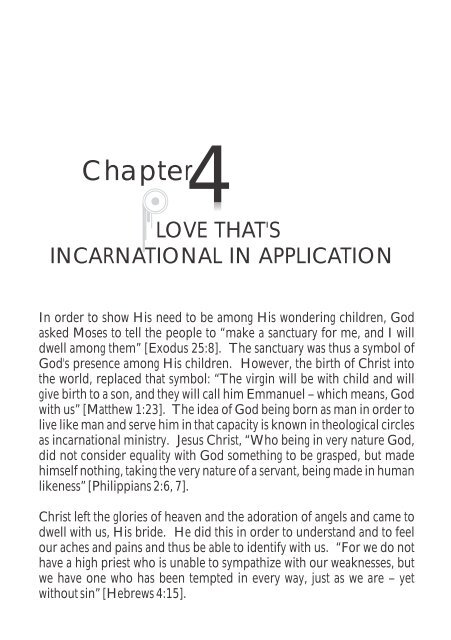Passionate LOVE_final
Passionate Love is a must read for all couples who desire to create and maintain a lasting love and passion filled marriage. In Passionate Love, Pastor George Mwansa outlines how husbands ought to love their wives by systematically drawing lessons from Christ's love for the church. He also gives wives guidelines on how to submit to their husbands – God's way.
Passionate Love is a must read for all couples who desire to create and maintain a lasting love and passion filled marriage. In Passionate Love, Pastor George Mwansa outlines how husbands ought to love their wives by systematically drawing lessons from Christ's love for the church. He also gives wives guidelines on how to submit to their husbands – God's way.
Create successful ePaper yourself
Turn your PDF publications into a flip-book with our unique Google optimized e-Paper software.
Chapter<br />
<strong>LOVE</strong> THAT'S<br />
INCARNATIONAL<br />
44<br />
IN APPLICATION<br />
In order to show His need to be among His wondering children, God<br />
asked Moses to tell the people to “make a sanctuary for me, and I will<br />
dwell among them” [Exodus 25:8]. The sanctuary was thus a symbol of<br />
God's presence among His children. However, the birth of Christ into<br />
the world, replaced that symbol: “The virgin will be with child and will<br />
give birth to a son, and they will call him Emmanuel – which means, God<br />
with us” [Matthew 1:23]. The idea of God being born as man in order to<br />
live like man and serve him in that capacity is known in theological circles<br />
as incarnational ministry. Jesus Christ, “Who being in very nature God,<br />
did not consider equality with God something to be grasped, but made<br />
himself nothing, taking the very nature of a servant, being made in human<br />
likeness” [Philippians 2:6, 7].<br />
Christ left the glories of heaven and the adoration of angels and came to<br />
dwell with us, His bride. He did this in order to understand and to feel<br />
our aches and pains and thus be able to identify with us. “For we do not<br />
have a high priest who is unable to sympathize with our weaknesses, but<br />
we have one who has been tempted in every way, just as we are – yet<br />
without sin” [Hebrews 4:15].



